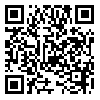Volume 11, Issue 2 (6-2020)
JAP 2020, 11(2): 14-25 |
Back to browse issues page
1- University of kharazmi , m.hadadnezhad@yahoo.com
2- University of kharazmi
2- University of kharazmi
Abstract: (1712 Views)
Aims and background: Inappropriate kinetic and kinematic are considered as effective factors in knee injuries especially patellofemoral pain. The aim of this study was to investigate the immediate effect of Mulligan taping on knee dynamic valgus, maximum knee flexion angle, the maximum ground reaction force, time to stabilization and pain in physically active female with patellofemoral pain and dynamic knee valgus. Materials and methods: Fifteen physically active female with patellofemoral pain and dynamic knee valgus was selected purposefully. Before and after Mulligan taping, dynamic knee valgus and flexion in single leg landing and squatting were measured using a two-dimensional video-based method, pain with visual analogue scale and maximum ground reaction force and time to stabiliz during the single leg landing on the force plate were assessed. Dependent t-test was used to statistical analysis (α≤0.05). Findings: The results of dependent t-test showed that the pain (p=0.041, 24.4% reduction), dynamic knee valgus was significantly decreased during single-leg squatting (p=0.001, 58.2% reduction), and landing (p=0.001, 42.9% reduction), and time to stabilization (p=0.033, 64.7% reduction) after taping. However, the maximum knee flexion angle (p=0.518), and the maximum ground reaction force(p=0.267) did not show a significant difference. Conclusion: The results of this study revealed that Mulligan corrective taping can reduce knee dynamic valgus angle, time to stabilization and pain. Therefore, this method of taping recommended due to modify the related and exacerbating factors of patellofemoral pain and pain reduction in active female with this disorder and dynamic valgus.
Type of Study: Original |
Subject:
Chronic pain managment
Received: 2019.08.21 | Accepted: 2020.02.27 | Published: 2020.06.30
Received: 2019.08.21 | Accepted: 2020.02.27 | Published: 2020.06.30
| Rights and permissions | |
 |
This work is licensed under a Creative Commons Attribution-NonCommercial 4.0 International License. |



